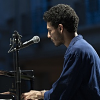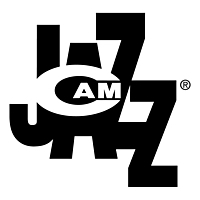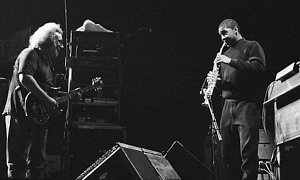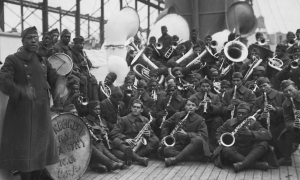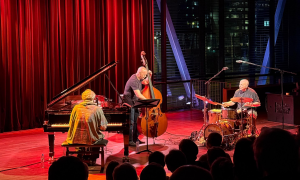Home » Jazz Articles » Interview » Wajdi Riahi: Something That Feels Honest
Wajdi Riahi: Something That Feels Honest

Courtesy Valentine Jamis
For me, jazz is a true language that brings people together—a language full of freedom and risk-taking.
All About Jazz: Having recently performed your first piano solo concert at Bozar in Brussels. How that experience resonated with you, not just as a performance, but as a deeper engagement with your music?
Wajdi Riahi: Fortunately, I had the chance to rehearse in the concert hall for two days before the concert. I admit that it took away a lot of the stress I might have had on the day of the concert. It was my first official solo concert, and it was in the large Bozar hall, which gave me a huge boost of energy to prepare. The date had been set almost a year in advance, and since then, there wasn't a day that passed without me thinking about the concert. I had always been used to being accompanied, whether by Basile and Pierre or other musicians with whom I share the concert moment, especially the moments before the concert, because they play a huge role in the mindset with which we step onto the stage.
AAJ: In the solitude of the solo setting, without the dialogue of your trio, did you find yourself connecting with the 'source' of the music in a different way?
WR: This time, however, it was a moment of solitude; there were no jokes before the concert, no collective moments of concentration. For the very first try-out of the solo my manager Paméla Malempré said a sentence that really helped me: "Imagine the stage as if it were your living room." I thought a lot about that because I've always felt more relaxed when I play at home. That said, it's not easy, but it helped me a lot to create an atmosphere I'm familiar with. I always need to play a lot before the concert starts; it gives me more confidence and fluidity in my playing. I was lucky to have a good piano in the Bozar dressing rooms, so I arrived earlier than planned for that reason. I feel that I always need that time to connect with the instrument. It's different with the trio, for example, because each of us is there to support the others and offer ideas during the concert. That aspect disappears when it's just you. What remains is the instrument, the room, and silence.
AAJ: And reflecting on that experience, what did it reveal to you about your own evolving relationship with the piano and the ongoing search for authenticity in your playing?
WR: My relationship with the piano has changed because, quite simply, this instrument has existed for hundreds of years, and honestly, I think everything I'm going to play has probably been played before. So, for me, creativity takes on another form that becomes more related to fun. I believe the moments when I have the most fun are the most "creative" moments I can have. I understand that people/listeners might expect me to perform a whole repertoire of personal compositions around the piano, but I try more and more to have as much fun as possible, and that doesn't necessarily require having personal compositions, in my opinion. The time I spent understanding what J. S. Bach wanted to express in the preludes and fugues he wrote was the time when I learned the most. I didn't try to translate his counterpoints into simple jazz chords, but I understood the harmony/colors through the notes, and then tried to improvise around that. This gives another approach to improvisation that is different from what is taught in schools or whatever... and this is where the freedom I've been seeking for a long time comes from.
AAJ: Your music beautifully blends jazz with elements of North African musical traditions. How your Tunisian heritage has shaped your musical identity and compositional approach? Are there specific musical forms or concepts from Tunisian music that you consciously incorporate into your playing like particular scales, rhythms, or melodic patterns?
WR: I always avoid talking about fusion because it should be something very innocent that comes out in the playing or composition without asking for permission. It's something that exists naturally, like an accent in people who speak a foreign language, and that has always fascinated me. But it has to work organically. When I learned Arabic/Tunisian music, it was more of a ritual. It was the music that accompanied my life in the cafés of Tunis, on the radio, at the Tunis Conservatory, with my father and my whole family. It's a music that is very much based on improvisation and the interpretation of melodies. I was surprised when I discovered jazz because it has the same aspects, with a different language. But my role is to connect the two by thinking about the common points—rhythm, melody, counterpoint, and even harmony. So yes, it definitely exists in the music I write, but I don't do it on purpose.
AAJ: Can you recall some of your earliest musical experiences in Tunisia? What were the sounds and influences that first drew you to music?
WR: The first experiences I had in Tunisia were during weddings. My father always took my brother and me with him to play at wedding celebrations. I had a keyboard with quarter tones, and that was my main instrument for a long time before I discovered jazz. That being said, I remember very well the first jazz concert I played in Tunisia—it was a tribute to hard bop jazz. I was so stressed that I wanted to go home before the concert and not go through with it.
But I have to say that I started playing classical piano when I was a child, around the age of five or six.
AAJ: You've been based in Brussels for some time now, a city with a vibrant and diverse jazz scene. How has the city's musical environment, and its diverse cultural landscape, impacted your artistic development as a musician? What are your thoughts on the current jazz scene in Belgium?
WR: I have been based in Brussels, Belgium, for seven years now. It's a really great city, and so much is happening in the Belgian jazz scene. It has taught me to go out all the time, attend jam sessions, and always try to learn as much as I can. I play in many different projects here, and that has helped me grow a lot because each experience is different. The musicians I play with all have different approaches, and it's very enriching to have the chance to play all this beautiful music.
I had an amazing piano teacher, Eric Legnini, who helped me tremendously in developing my approach to music and the instrument.
AAJ: How would you define jazz in your own terms, how do you see your music fitting into or pushing against that definition?
WR: For me, jazz is a true language that brings people together—a language full of freedom and risk-taking. But I also love Charles Mingus' response: "I don't know, and I don't care."
That being said, I would say that jazz, or music in general, is a true reason to live.
AAJ: Since forming in 2020, your trio with Basile and Pierre has explored your Tunisian heritage (Mhamdeya) and now delves into Stambeli and Gnawa traditions (Essia), creating a distinctive sound with modern jazz. As the trio's sound has evolved, has your approach to composing for them changed?
WR: The process of writing music is a real mystery to me because everyone has their own way of doing it. What matters most to me is writing something that feels honest in my own sense. The idea of trying to play Stambeli or Gnawa with Basile and Pierre wasn't just something that came from me alone. We spent time listening to this music together because sometimes I can't find the right words to describe it—a certain groove, or rather, a feeling of groove.
But listening to it collectively really helps to understand a lot of things. Art comes into our lives when we can't find the exact words to express something.
AAJ: Considering trio dynamic, how do you compose? With parts in mind, collaborative improvisation, or a combination of these two?
WR: Usually, I sit at the piano and try to find ideas. It can start with a bass line, rhythmic motifs, or a harmonic idea that I develop, and that eventually shapes the DNA of the piece.
AAJ: Do you strive for perfection in your music, or do you find beauty in imperfection and spontaneity?
WR: It depends on the process.
I appreciate perfection when I practice my instrument, but I love imperfection when I play with others. It always reminds me how imperfect and vulnerable humans can be.
AAJ: What to you is the essence of a truly compelling melody? What makes a melody resonate with the listener?
WR: That's a very difficult question.
We can be emotionally moved by different melodies or sounds.
But for me, a true melody is one that makes me cry, gives me goosebumps, takes me back in time like a scent memory, or makes me dance. That's a true Melody for me.
AAJ: Beyond your trio, you've also been involved in various other musical projects, collaborating with different musicians and exploring different genres or styles. Could you discuss some of these experiences, and how playing in these diverse contexts has influenced your musical development and perhaps even informed your approach to your own trio work? Are there particular collaborations or projects that have been especially significant or challenging for you?
WR: I would say my experience with Stéphane Galland because he is much more than just a bandleader to me—he is my mentor and a true master.
This experience began when Stéphane started working on his PhD, and he asked me to join a group of musicians who were his former students at Royal Conservatory Brussels. However, I wasn't from the same conservatory. I remember him telling me about Malcolm Braff, a fantastic pianist.
I learned a lot from Stéphane because his compositions are not easy from a rhythmic perspective—they are actually quite complex. But his goal was for us to play this music in a way that didn't make it sound complex. We worked a lot on the repertoire and the rhythmic vocabulary we could use to facilitate musical dialogue later on.
One of the most beautiful experiences of my life.
AAJ: What are your plans for the future, both in terms of recording and performing? Are there any new musical directions or collaborations you're exploring?
WR: There will be big news for 2026, but it will be announced soon, so I don't want to spoil the surprise.
For me, the trio with Basile and Pierre is a true adventure, and I would love for it to last my whole life.
Tags
Comments
PREVIOUS / NEXT
Support All About Jazz
 All About Jazz has been a pillar of jazz since 1995, championing it as an art form and, more importantly, supporting the musicians who make it. Our enduring commitment has made "AAJ" one of the most culturally important websites of its kind, read by hundreds of thousands of fans, musicians and industry figures every month.
All About Jazz has been a pillar of jazz since 1995, championing it as an art form and, more importantly, supporting the musicians who make it. Our enduring commitment has made "AAJ" one of the most culturally important websites of its kind, read by hundreds of thousands of fans, musicians and industry figures every month.


